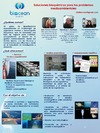Identificador persistente para citar o vincular este elemento:
https://accedacris.ulpgc.es/jspui/handle/10553/11842
| Título: | A parallel future for Ocean research? | Otros títulos: | Soluciones bioquímicas para tus problemas medioambientales | Autores/as: | Gómez, May Martínez, Ico Packard, Theodore T. |
Clasificación UNESCO: | 251001 Oceanografía biológica 240119 Zoología marina 241705 Biología marina |
Palabras clave: | Ecofisiología Bioquímica |
Fecha de publicación: | 2014 | Conferencia: | IV Congress of Marine Sciences | Resumen: | Today, science is difficult to pursue because funding is so tenuous. In such a financial climate, researchers need to consider parallel alternatives to ensure that scientific research can continue. Based on this thinking, we created BIOCEANSolutions, a company born of a research group. A great variety of environmental regulations and standards have emerged over recent years with the purpose of protecting natural ecosystems. These have enabled us to link our research to the market of environmental management. Marine activities can alter environmental conditions, resulting in changes in physiological states, species diversity, abundance, and biomass in the local biological communities. In this way, we can apply our knowledge, to plankton ecophysiology and biochemical oceanography. We measure enzyme activities as bio-indicators of energy metabolism and other physiological rates and biologic-oceanographic processes in marine organisms. This information provides insight into the health of marine communities, the stress levels of individual organisms, and potential anomalies that may be affecting them. In the process of verifying standards and complying with regulations, we can apply our analytic capability and knowledge. The main analyses that we offer are: (1) the activity of the electron transport system (ETS) or potential respiration (Φ), (2) the physiological measurement of respiration (oxygen consumption), (3) the activity of Isocitrate dehydrogenase (IDH), (4) the respiratory CO2 production, and (5) the activity of Glutamate dehydrogenase (GDH) and (6) the physiological measurement of ammonium excretion. In addition, our experience in a productive research group allows us to pursue and develop technical-experimental activities such as marine and freshwater aquaculture, oceanographic field sampling, as well as providing guidance, counseling, and academic services. In summary, this new company will permit us to create a symbiosis between public and private sectors that serve clients and will allow us to grow and expand as a research team. | URI: | https://accedacris.ulpgc.es/handle/10553/11842 | Fuente: | IV Simposio de Ciencias del Mar |
| Colección: | Póster de congreso |
Visitas
51
actualizado el 10-ene-2026
Descargas
11
actualizado el 10-ene-2026
Google ScholarTM
Verifica
Comparte
Exporta metadatos
Este elemento está sujeto a una licencia Licencia Creative Commons

